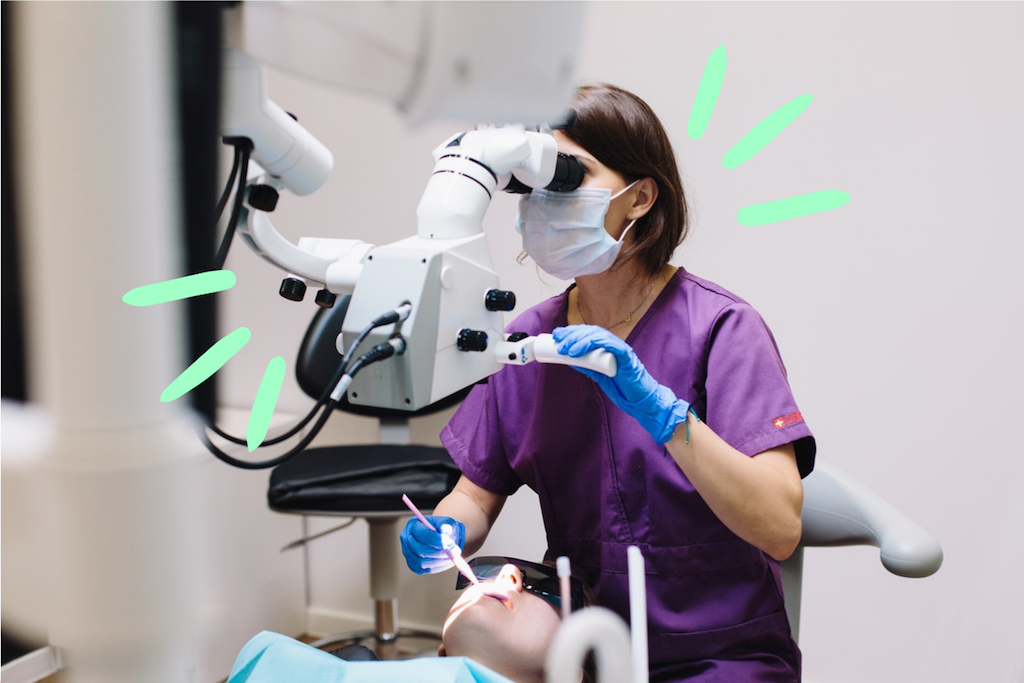As you age, keeping your adult teeth and mouth healthy can be challenging due to an increased risk of health conditions that make you more vulnerable to dental problems. After a lifetime of chewing, grinding, general wear and tear, medications and medical conditions, alongside a decrease in dental care, oral health problems become more prevalent as you age.
Dental Conditions To Be Aware Of In Older Adults
These problems can result in a range of symptoms such as inflamed gums, bleeding gums, tooth pain, or even gum infections, which can typically be treated or managed by regular visits to your dentist. In this guide, we cover the 9 common dental conditions all older adults should be aware of, as well as advice on prevention, treatment and management.
Tooth Decay
Tooth decay can lead to cavities, which are decayed areas of your teeth that develop into tiny openings or holes and lead to pain, infection, and even tooth loss. Tooth decay is often a result of a build-up of plaque and tartar due to poor dental hygiene and a diet of sugary foods, snacking between meals, and a decrease in saliva production, which leads to high levels of sugar and acid in the mouth.
Medical conditions can also play a role in tooth decay; for instance, using a toothbrush can be more challenging for those with arthritis and is often impossible for people suffering from dementia.
Prevention is the best way to avoid tooth decay as you age which involves brushing your teeth twice a day with fluoride toothpaste, drinking water after each meal, and decreasing the amount of sugary food you consume.
Additionally, switching from a manual toothbrush to an electric one may be easier for those with arthritis and is often more effective than using a traditional toothbrush. Suppose tooth decay is a concern, or you’ve begun to notice pain; well, you do have options available to you, including fluoride rinse fillings or crowns to combat advanced decay.

Gum Disease
Gum disease, also known as periodontal disease, is a common problem typically caused by a build-up of plaque and tartar due to poor dental hygiene, diet, and smoking. The symptoms of gum disease normally include irritated, red, and bleeding gums; however, there is more than one type of gum disease. The symptoms can present differently, which is why it is essential to visit your dentist frequently to spot gum disease early.
Gingivitis is a type of gum disease where there is inflammation of the gums due to bacteria build-up where the teeth meet the gum tissue. Gingivitis can advance and develop into a serious gum infection that causes damage to the gum tissue and the bone that supports the teeth, and this condition is called periodontitis.
However, gum disease is preventable and treatable with proper dental care, which includes visiting your dentist regularly as well as flossing and brushing daily.
Receding Gums
A common problem often caused by smoking, poor dental hygiene, gum disease, teeth grinding, or a family history of dental health conditions is gum recession. In this gradual process, gums shrink away from teeth.
As gum recession progresses, teeth appear to lengthen and may become more sensitive as the tooth’s root becomes exposed. If left untreated, gum recession can increase the likelihood of developing gum disease and tooth loss and significant damage to oral tissue.
However, in the same way as gum disease, this condition is preventable by practising good oral hygiene, avoiding sugary foods, and quitting smoking. Suppose you notice signs of your gums receding. In that case, you must visit the dentist as soon as possible to best address the issue and discuss treatment options such as deep cleaning, scaling, or surgical gum grafts. Only then, can you smile with more confidence as you move forward in life.
Dry Mouth
Many people over the age of 40 experience decreased saliva productions, a common condition known as dry mouth or xerostomia. Still, as Meadowbank dental, a dental clinic in Edinburgh, reassures us, it is also a common side effect of many medications, including antidepressants. When you have decreased saliva production, sugar and acids build up more readily in the mouth, resulting in cavities and leading to other dental conditions such as gum disease.
Aside from cavities and gum disease, a reduction in your saliva production can also cause dry, cracked lips and a swollen tongue, making it more difficult to speak and swallow. To avoid the negative consequences of dry mouth, you must drink plenty of water while avoiding food and drinking high in sugar. Additionally, lozenges and chewing gum are often used to stimulate saliva production alongside mouth rinses as they can help prevent the build-up of sugars and acid.

Oral Cancer
As with many cancers, the risks of oral cancer increase with age, especially in people who regularly smoke or drink. You must visit your dentist frequently as many oral cancers have few symptoms, and your dentist will be able to spot abnormal changes in your mouth with regular examinations. Early identification is the perfect way to ensure a positive prognosis. Your dentist can also assist you in assuring that your gums and surrounding tissue are as healthy as possible.
Missing Teeth
Missing tooth is a problem that can occur due to poor dental hygiene or accidents and injuries; however, as you age, your risk of losing teeth increases. Missing teeth can affect how you eat or speak, and even if it is not noticeable, it can significantly impact the quality of your life. Your remaining teeth may shift into uncomfortable positions, and, in some cases, a missing tooth can also lead to bone loss around the area.
As dentistry has advanced over the years, so have the treatments for missing teeth, and you no longer need to live with gaps in your mouth. Your dentist can advise you on the best cause of action and which treatments suit you, such as bridges, dentures, dental crowns, or dental implants.
Sensitivity
When eating food, if you notice hot or cold food cause you to wince, you may be suffering from a common dental problem called sensitive teeth. Sensitivity can occur for many reasons, such as tooth decay, fractured teeth, worn fillings, gum disease, worn teeth, and exposed roots.
However, sensitive teeth can be treated, and your dentist will typically recommend desensitizing toothpaste or treatments based on the cause of your sensitivity. To prevent tooth sensitivity, you need to ensure you are keeping a proper oral hygiene routine. Still, if you are unsure if there is anything more you need to do at home, your dentist can provide you with expert advice to improve your dental care.
Teeth Crowding
Teeth crowding is a common problem as you age, as your teeth can shift and move over time, leading to increased difficulty in cleaning, erosion, and damage to the gum tissue. The first indicators that you may have teeth crowding is usually food getting stuck in new places within your mouth and discomfort in how they fit together. If you leave teeth crowding untreated, it can result in an accelerated decay of your teeth, which is why you must visit your dentist at the first signs of changes or discomfort.

Root Decay
Root decay is particularly prevalent among older adults, often due to receding gums which expose the roots of the teeth to plaque and acids. Unlike the crowns of your teeth, the roots do not have a protective enamel layer, making them more susceptible to decay. Factors such as dry mouth, which reduces the protective benefits of saliva, and dietary habits can exacerbate this condition.
Symptoms of root decay can include sensitivity, pain, and in severe cases, infection. To prevent root decay, it is crucial to maintain excellent oral hygiene, use fluoride toothpaste, and possibly incorporate fluoride rinses as recommended by your dentist. Regular dental check-ups are essential for early detection and treatment, which may include fillings, fluoride treatments, or even root canals if the decay has reached the nerve of the tooth.
The Bottom Line
Maintaining oral health as you age is crucial for overall well-being and quality of life. Prevention remains the best defense against these conditions, with proper brushing, flossing, and professional cleanings as the cornerstone of good oral hygiene. Additionally, lifestyle choices such as a balanced diet, limiting sugar intake, and avoiding tobacco can significantly reduce the risk of dental problems.
Remember, it’s never too late to start taking better care of your teeth and gums. By staying informed and working closely with your dental care provider, you can tackle these common issues head-on and keep your smile healthy and bright well into your golden years.





